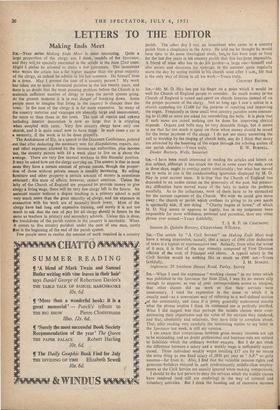LETTERS TO THE EDITOR
Making ,Ends Meet Six—Your series Making Ends Meet is most interesting. Quite a large proportion of the clergy are, I think, readels of the Spectator, and they will be specially interested in the article in the June 22nd issue. Might I please be allowed to make a few comments. The incumbent who writes the article has a far higher income than the great majority of the clergy, as indeed he admits in his last sentence. He himself lives in a town. May I present the case of a • country parson ? My work has taken me to quite a thousand parishes in the last twenty years, and there is no doubt that the most pressing problem before the Church is to maintain sufficient number of clergy to keep the parish system going. At the present moment it is in real danger of breaking down. Some people seem to imagine that living in the country is cheaper than the town. In the case of the clergy it is far more expensive. So many of the country rectories and vicarages are absurdly large and inconvenient, far more so than those in the town. The cost of repairs and upkeep including interior decoration is now so large that it is crippling when coupled with rates. Very few country clergy have only one church, and it is quite usual now to have three. In such cases a car is a necessity, if the work is to be done properly.
The Archdeacon of Ely, in a speech to the Diocesan Conference, pointed out that after deducting the necessary sum for dilapidations, repairs, car, and other expenses allowed by the income-tax authorities, plus income tax, the country parson with £4 a week clear to live on is about the average. There are very few manual workers in this financial position. It may be asked how are the clergy carrying on. The answer is that in most cases they have a certain amount of private means, though the propor- tion of those without private means is steadily increasing. By selling furniture and other property a certain amount of money is sometimes obtained ; this state of affairs, however, cannot continue. Unless the laity of the Church of England are prepared to provide money to give clergy a living wage, there will be very few clergy left in the future. An assistant master without a degree teaching in a primary school is paid very much more than the great majority of clergy, and his expenses in connection with his work aro of necessity much lower. Most of the clergy have had long and expensive training, and surely it is not too much to ask that the rate of pay for all clergy should in future be the same as teachers in primary and secondary schools. Unless this is done, the breakdown of the, parish system in the country is inevitable. When it comes to five country parishes under the care of one man, surely that is the beginning of the end of the parish system.
Few people seem to realise the amount of work required in a country
parish. The other day I met an incumbent who came to a country parish from a chaplaincy in the Army. He told me he thought he would have time to do some theological study, butihe has been kept so busy for the last five years in his country parish that this has \been impossible. A friend of mine who has to do his garden—a large one—himself and 'also paints and decorates his vicarage, in the summer quite regularly starts the day by saying matins in his church soon after 5 a.m., fdr that is the only way' of fitting in all his work.—Yours truly,
COUNTRY RECTOR.






















































 Previous page
Previous page